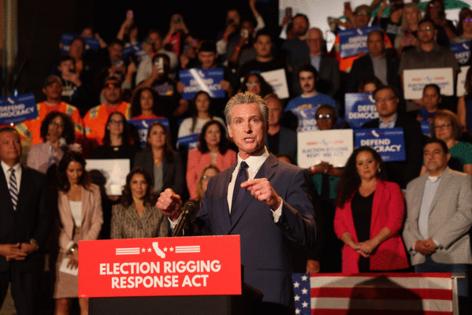California Republicans say redistricting legislation needs more review time, ask state Supreme Court to intervene
Published in News & Features
Republican legislators asked the California Supreme Court to intervene and hit the brakes on redistricting efforts underway in the statehouse.
Legislators are making fast work this week on Gov. Gavin Newsom’s proposal to redraw the state’s congressional boundary lines ahead of the 2026 midterm elections. Newsom’s effort is meant to “neutralize” similar partisan redistricting efforts in Republican-led states, including Texas, and would require approval by voters in a November special election.
State legislators are scheduled to hold floor votes on Thursday, according to a schedule from Democratic leadership.
But Republicans, in their petition to the state Supreme Court on Tuesday, said proposed legislation must be published for 30 days before the legislature can hear or act on it. The filing alleges that rule was “circumvented” by the legislature by replacing two unrelated bills with the redistricting proposal, a move called “gut and amend” by those in Sacramento.
The 30-day waiting period enshrined in the state constitution “serves an important purpose,” the lawsuit said. “Both the public and lawmakers must be afforded adequate time to review and deliberate upon proposed legislation before the Legislature acts upon it.”
“This case does not challenge the use of gut and amend for all purposes, but is confined to the narrow case where the Legislature blatantly and intentionally uses it to circumvent a constitutional right of the people to adequate time to review proposed legislation — a right that is inherently meant to restrain the Legislature from ramming legislation into law without an opportunity for the public to review it,” it said.
Republicans, in the lawsuit, asked the state Supreme Court to prevent further action on the redistricting legislation until the 30 days have passed.
The lawsuit is led by Sens. Tony Strickland, R-Huntington Beach, and Suzette Martinez Valladares, R-Santa Clarita, as well as Assemblymembers Kate Sanchez, R-Rancho Santa Margarita, and Tri Ta, R-Westminster.
Spokespeople for Senate President Pro Tem Mike McGuire and Assembly Speaker Robert Rivas did not immediately respond to requests for comment Tuesday morning.
The “gut and amend” procedure isn’t new or unique to the redistricting legislation. In fact, it happens “probably well over 100 times per year,” said veteran Sacramento lobbyist Chris Micheli.
Calling the constitutional 30-day rule “a remnant of the Pony Express times when it took a long time to disseminate bills,” Micheli does not believe the lawsuit will be successful because of how that provision has always been interpreted by the legislature.
As Micheli explained in an article about the process, it’s up to the majority of Assembly members or senators to decide whether amendments “are germane” to a bill, “and, therefore, whether the gut-and-amend was proper or not.” And voters in 2016 approved Proposition 54, which requires a 72-hour waiting period before a final version of a bill can be voted on, Micheli noted.
“I appreciate the creativity, but I don’t think that a court would rule differently than how the legislature does,” Micheli said in an interview. “The bottom line is I don’t think that sort of a legal challenge is going to make it.”
Meanwhile, on Tuesday, the election committees in the state Senate and Assembly began their hearings on the redistricting legislation.
Those who support the redistricting proposal called it a much-needed effort to counter what’s taking place in other, Republican-led states, in particular, Texas. Legislators and experts who testified during the committees said they preferred independent commissions drawing congressional boundary lines but viewed this effort as necessary to protect democracy.
“These are extreme attacks on our core democratic principles, and these attacks must be met with decisive action,” Sara Sadhwani, who serves on California’s independent commission, told senators.
“It brings me no joy to see the maps that we passed fairly by the commission to be tossed aside for this new set of maps,” she said. “The commission is an excellent process … but I do believe this is a necessary step in a much bigger battle to shore up free and fair elections in our nation.”
Newsom launched his redistricting campaign with a rally in Los Angeles last week.
Newsom is “destroying democracy in California if he’s successful,” Strickland said during a press conference Tuesday morning. “Because what will end up happening is we won’t have any competitive seats throughout the state of California, and the voters will have no voice.”
“That’s not good for Democrats, independents or Republicans,” he said.
Republicans, in their lawsuit, asked the court to rule by Wednesday that the redistricting legislation cannot be acted upon before Sept. 18.
The California secretary of state’s office has told legislators that Aug. 22 is “close to the edge of what is technically possible” to call for a special election in November. However, Jim Patrick, a spokesperson for the secretary of state’s office, pushed back on calling Aug. 22 a “deadline.”
“We don’t set deadlines for lawmakers,” he previously told the Southern California News Group.
The lawsuit is led by the Dhillon Law Group, founded by Harmeet Dhillon, who leads the Justice Department’s Civil Rights Division in the Trump administration.
_____
©2025 MediaNews Group, Inc. Visit ocregister.com. Distributed by Tribune Content Agency, LLC.







Comments